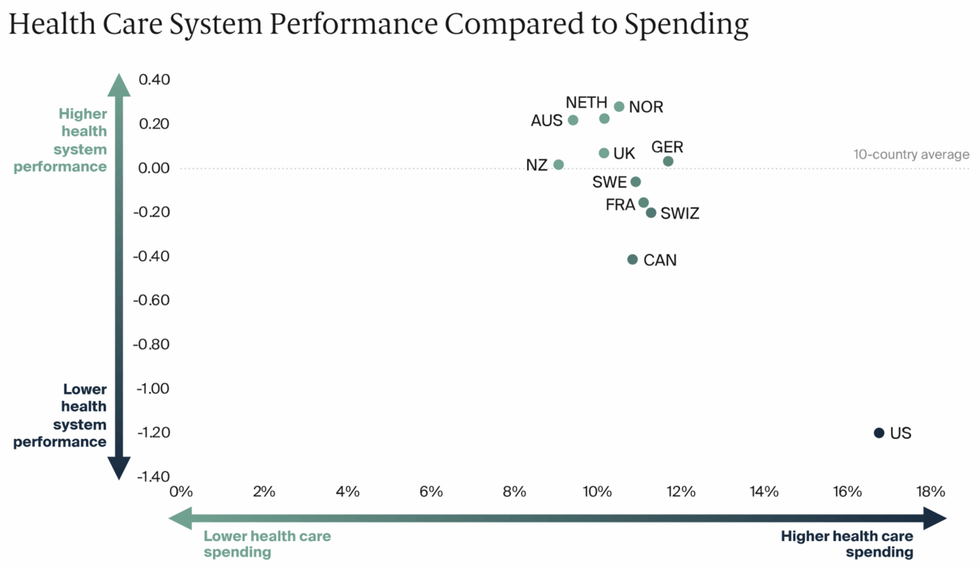
Public health workers, doctors, and nurses protest outside a hospital in the Bronx on April 17, 2020 in New York. (Photo: Giles Clarke/Getty Images)
'Time for Medicare for All': US Healthcare System Ranks Dead Last Among Rich Nations--Again
"There's no question: our cruel, for-profit healthcare system is broken," said Rep. Pramila Jayapal.
The United States spends far more of its GDP on healthcare than other rich countries yet still has the highest infant and maternal mortality rates, the lowest life expectancy at age 60, and the most glaring inequities, according to a new report released Wednesday by the Commonwealth Fund.
" Single-payer Medicare for All would address some of our most pressing problems by establishing no-cost access to care for all Americans."
--Physicians for a National Health Program
Using a range of criteria to evaluate the healthcare systems of 11 countries--Australia, Canada, France, Germany, the Netherlands, New Zealand, Norway, Sweden, Switzerland, the United Kingdom, and U.S.--the Commonwealth Fund's latest analysis (pdf) shows that the U.S. once again "ranks last on access to care, administrative efficiency, equity, and healthcare outcomes."
The lone bright spot for the for-profit U.S. healthcare system, according to the new report, is in a category dubbed "care process," which includes "measures of preventive care, safe care, coordinated care, and engagement and patient preferences."
"There's no question: our cruel, for-profit healthcare system is broken," Rep. Pramila Jayapal (D-Wash.), chair of the Congressional Progressive Caucus and lead House sponsor of the Medicare for All Act of 2021, said in response to the report.
"It's time to fix it," Jayapal added. "It's time to guarantee health care as a human right. It's time for Medicare for All."
In 2019, the U.S. spent 16.8% of its GDP on healthcare, 5.5 percentage points more than the next country on the list, Switzerland. By contrast, Norway--which has the top-performing system according to the Commonwealth Fund's metrics--spent just 10.5% of its GDP on healthcare that same year.
Despite sky-high spending fueled by several factors--including exorbitant prices for prescription drugs and medical services--the U.S. ranked last in nine of the Commonwealth Fund's 10 outcome measures, including preventable mortality (177 deaths per 100,000 population), life expectancy at age 60 (23.1 years), and infant mortality (5.7 deaths per 1,000 live births).
The United States' maternal mortality rate (17.4 deaths per 100,000 live births) is more than two times higher than France's (7.6 deaths per 100,000 live births).

One potential cause of poor healthcare outcomes in the U.S., the report notes, are deep inequities in access to the expensive system, which is in large part dominated by major private insurance companies and for-profit hospital systems.
"The U.S. consistently demonstrated the largest disparities between income groups" when it came to obtaining healthcare services, according to the Commonwealth Fund. Due to inability to afford the costs, low-income people in the U.S. were far more likely to report skipping treatments and doctor visits than low-income residents of other rich nations.
"U.S. disparities are especially large when looking at financial barriers to accessing medical and dental care, medical bill burdens, difficulty obtaining after-hours care, and use of web portals to facilitate patient engagement," the report reads. "The U.S. health system delivers too little of the care that's most needed--and often delivers it too late--especially for people with complex chronic illness, mental health problems, or substance use disorders, many of whom have faced a lifetime of inequitable access to care."
"The high U.S. death toll during the Covid-19 pandemic," the report continues, "illustrates the difficulty of achieving good healthcare outcomes if the population is sicker and access to preventive and primary care is limited, particularly because of affordability barriers."
The Commonwealth Fund spotlights four features of high-performing healthcare systems that allow them to deliver far superior care for less cost than the fragmented U.S. system:
- They provide for universal coverage and remove cost barriers;
- They invest in primary care systems to ensure that high-value services are equitably available in all communities to all people;
- They reduce administrative burdens that divert time, efforts, and spending from health improvement efforts; and
- They invest in social services, especially for children and working-age adults.
In a series of tweets calling attention to the new analysis, Physicians for a National Health Program argued there are "many issues" plaguing the U.S. healthcare system, "but single-payer Medicare for All would address some of our most pressing problems by establishing no-cost access to care for all Americans; bolstering primary care; and drastically reducing administrative costs."
"Ultimately," the group wrote, "lives are at stake."
An Urgent Message From Our Co-Founder
Dear Common Dreams reader, The U.S. is on a fast track to authoritarianism like nothing I've ever seen. Meanwhile, corporate news outlets are utterly capitulating to Trump, twisting their coverage to avoid drawing his ire while lining up to stuff cash in his pockets. That's why I believe that Common Dreams is doing the best and most consequential reporting that we've ever done. Our small but mighty team is a progressive reporting powerhouse, covering the news every day that the corporate media never will. Our mission has always been simple: To inform. To inspire. And to ignite change for the common good. Now here's the key piece that I want all our readers to understand: None of this would be possible without your financial support. That's not just some fundraising cliche. It's the absolute and literal truth. We don't accept corporate advertising and never will. We don't have a paywall because we don't think people should be blocked from critical news based on their ability to pay. Everything we do is funded by the donations of readers like you. Will you donate now to help power the nonprofit, independent reporting of Common Dreams? Thank you for being a vital member of our community. Together, we can keep independent journalism alive when it’s needed most. - Craig Brown, Co-founder |
The United States spends far more of its GDP on healthcare than other rich countries yet still has the highest infant and maternal mortality rates, the lowest life expectancy at age 60, and the most glaring inequities, according to a new report released Wednesday by the Commonwealth Fund.
" Single-payer Medicare for All would address some of our most pressing problems by establishing no-cost access to care for all Americans."
--Physicians for a National Health Program
Using a range of criteria to evaluate the healthcare systems of 11 countries--Australia, Canada, France, Germany, the Netherlands, New Zealand, Norway, Sweden, Switzerland, the United Kingdom, and U.S.--the Commonwealth Fund's latest analysis (pdf) shows that the U.S. once again "ranks last on access to care, administrative efficiency, equity, and healthcare outcomes."
The lone bright spot for the for-profit U.S. healthcare system, according to the new report, is in a category dubbed "care process," which includes "measures of preventive care, safe care, coordinated care, and engagement and patient preferences."
"There's no question: our cruel, for-profit healthcare system is broken," Rep. Pramila Jayapal (D-Wash.), chair of the Congressional Progressive Caucus and lead House sponsor of the Medicare for All Act of 2021, said in response to the report.
"It's time to fix it," Jayapal added. "It's time to guarantee health care as a human right. It's time for Medicare for All."
In 2019, the U.S. spent 16.8% of its GDP on healthcare, 5.5 percentage points more than the next country on the list, Switzerland. By contrast, Norway--which has the top-performing system according to the Commonwealth Fund's metrics--spent just 10.5% of its GDP on healthcare that same year.
Despite sky-high spending fueled by several factors--including exorbitant prices for prescription drugs and medical services--the U.S. ranked last in nine of the Commonwealth Fund's 10 outcome measures, including preventable mortality (177 deaths per 100,000 population), life expectancy at age 60 (23.1 years), and infant mortality (5.7 deaths per 1,000 live births).
The United States' maternal mortality rate (17.4 deaths per 100,000 live births) is more than two times higher than France's (7.6 deaths per 100,000 live births).

One potential cause of poor healthcare outcomes in the U.S., the report notes, are deep inequities in access to the expensive system, which is in large part dominated by major private insurance companies and for-profit hospital systems.
"The U.S. consistently demonstrated the largest disparities between income groups" when it came to obtaining healthcare services, according to the Commonwealth Fund. Due to inability to afford the costs, low-income people in the U.S. were far more likely to report skipping treatments and doctor visits than low-income residents of other rich nations.
"U.S. disparities are especially large when looking at financial barriers to accessing medical and dental care, medical bill burdens, difficulty obtaining after-hours care, and use of web portals to facilitate patient engagement," the report reads. "The U.S. health system delivers too little of the care that's most needed--and often delivers it too late--especially for people with complex chronic illness, mental health problems, or substance use disorders, many of whom have faced a lifetime of inequitable access to care."
"The high U.S. death toll during the Covid-19 pandemic," the report continues, "illustrates the difficulty of achieving good healthcare outcomes if the population is sicker and access to preventive and primary care is limited, particularly because of affordability barriers."
The Commonwealth Fund spotlights four features of high-performing healthcare systems that allow them to deliver far superior care for less cost than the fragmented U.S. system:
- They provide for universal coverage and remove cost barriers;
- They invest in primary care systems to ensure that high-value services are equitably available in all communities to all people;
- They reduce administrative burdens that divert time, efforts, and spending from health improvement efforts; and
- They invest in social services, especially for children and working-age adults.
In a series of tweets calling attention to the new analysis, Physicians for a National Health Program argued there are "many issues" plaguing the U.S. healthcare system, "but single-payer Medicare for All would address some of our most pressing problems by establishing no-cost access to care for all Americans; bolstering primary care; and drastically reducing administrative costs."
"Ultimately," the group wrote, "lives are at stake."
- Opinion | The US Is Quite Literally in a Neoliberal Death Spiral. We Need Medicare for All | Common Dreams ›
- Major Survey Finds 100 Million Americans See US Healthcare System as 'Expensive' or 'Broken' ›
- 'A Huge Win': DC Council Passes Medicare for All Resolution ›
- Once Free, Covid-19 Vaccines Now Cost Up to $200 for Uninsured in US | Common Dreams ›
- Opinion | Why Didn't the Covid-19 Pandemic Result in Medicare for All? | Common Dreams ›
- Opinion | My Father's Death Showed Me the Brokenness and Cruelty of US Healthcare | Common Dreams ›
The United States spends far more of its GDP on healthcare than other rich countries yet still has the highest infant and maternal mortality rates, the lowest life expectancy at age 60, and the most glaring inequities, according to a new report released Wednesday by the Commonwealth Fund.
" Single-payer Medicare for All would address some of our most pressing problems by establishing no-cost access to care for all Americans."
--Physicians for a National Health Program
Using a range of criteria to evaluate the healthcare systems of 11 countries--Australia, Canada, France, Germany, the Netherlands, New Zealand, Norway, Sweden, Switzerland, the United Kingdom, and U.S.--the Commonwealth Fund's latest analysis (pdf) shows that the U.S. once again "ranks last on access to care, administrative efficiency, equity, and healthcare outcomes."
The lone bright spot for the for-profit U.S. healthcare system, according to the new report, is in a category dubbed "care process," which includes "measures of preventive care, safe care, coordinated care, and engagement and patient preferences."
"There's no question: our cruel, for-profit healthcare system is broken," Rep. Pramila Jayapal (D-Wash.), chair of the Congressional Progressive Caucus and lead House sponsor of the Medicare for All Act of 2021, said in response to the report.
"It's time to fix it," Jayapal added. "It's time to guarantee health care as a human right. It's time for Medicare for All."
In 2019, the U.S. spent 16.8% of its GDP on healthcare, 5.5 percentage points more than the next country on the list, Switzerland. By contrast, Norway--which has the top-performing system according to the Commonwealth Fund's metrics--spent just 10.5% of its GDP on healthcare that same year.
Despite sky-high spending fueled by several factors--including exorbitant prices for prescription drugs and medical services--the U.S. ranked last in nine of the Commonwealth Fund's 10 outcome measures, including preventable mortality (177 deaths per 100,000 population), life expectancy at age 60 (23.1 years), and infant mortality (5.7 deaths per 1,000 live births).
The United States' maternal mortality rate (17.4 deaths per 100,000 live births) is more than two times higher than France's (7.6 deaths per 100,000 live births).

One potential cause of poor healthcare outcomes in the U.S., the report notes, are deep inequities in access to the expensive system, which is in large part dominated by major private insurance companies and for-profit hospital systems.
"The U.S. consistently demonstrated the largest disparities between income groups" when it came to obtaining healthcare services, according to the Commonwealth Fund. Due to inability to afford the costs, low-income people in the U.S. were far more likely to report skipping treatments and doctor visits than low-income residents of other rich nations.
"U.S. disparities are especially large when looking at financial barriers to accessing medical and dental care, medical bill burdens, difficulty obtaining after-hours care, and use of web portals to facilitate patient engagement," the report reads. "The U.S. health system delivers too little of the care that's most needed--and often delivers it too late--especially for people with complex chronic illness, mental health problems, or substance use disorders, many of whom have faced a lifetime of inequitable access to care."
"The high U.S. death toll during the Covid-19 pandemic," the report continues, "illustrates the difficulty of achieving good healthcare outcomes if the population is sicker and access to preventive and primary care is limited, particularly because of affordability barriers."
The Commonwealth Fund spotlights four features of high-performing healthcare systems that allow them to deliver far superior care for less cost than the fragmented U.S. system:
- They provide for universal coverage and remove cost barriers;
- They invest in primary care systems to ensure that high-value services are equitably available in all communities to all people;
- They reduce administrative burdens that divert time, efforts, and spending from health improvement efforts; and
- They invest in social services, especially for children and working-age adults.
In a series of tweets calling attention to the new analysis, Physicians for a National Health Program argued there are "many issues" plaguing the U.S. healthcare system, "but single-payer Medicare for All would address some of our most pressing problems by establishing no-cost access to care for all Americans; bolstering primary care; and drastically reducing administrative costs."
"Ultimately," the group wrote, "lives are at stake."
- Opinion | The US Is Quite Literally in a Neoliberal Death Spiral. We Need Medicare for All | Common Dreams ›
- Major Survey Finds 100 Million Americans See US Healthcare System as 'Expensive' or 'Broken' ›
- 'A Huge Win': DC Council Passes Medicare for All Resolution ›
- Once Free, Covid-19 Vaccines Now Cost Up to $200 for Uninsured in US | Common Dreams ›
- Opinion | Why Didn't the Covid-19 Pandemic Result in Medicare for All? | Common Dreams ›
- Opinion | My Father's Death Showed Me the Brokenness and Cruelty of US Healthcare | Common Dreams ›

